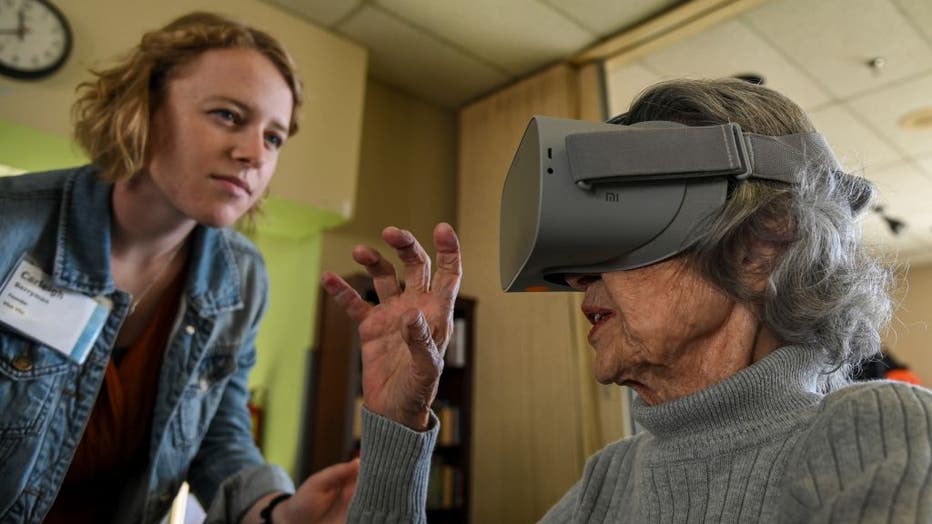'Oh my God, that's beautiful': Senior citizens try virtual reality in study showing their acceptance
Watch: Mom trying VR headset has hilarious reaction
A woman in Apex, North Carolina, had a hilarious reaction while trying out the Apple Vision Pro virtual reality headset for the first time on February 3. (Credit: Catalin Iuga via Storyful)
POMPANO BEACH, Fla. - Older generations, often known for their reluctance to embrace the latest technology, are warming up to the virtual reality world.
Several senior communities around the country recently participated in a Stanford University study as part of a larger effort to adapt VR, so it can be beneficial to seniors' health and emotional well-being and help lessen the impact dementia has on some of them.
During the testing, seniors picked from seven-minute virtual experiences such as parachuting, riding in a tank, watching stage performances, playing with puppies and kittens or visiting places like Paris or Egypt. The participants wore headsets that gave them 360-degree views and sounds, making it seem like they had been all but dropped into the actual experience.
John Knox Village was one of 17 senior communities that participated in the study.
RELATED: What is ‘popcorn brain?’: How social media could impact your focus
Retired Army Col. Farrell Patrick taught computer science at West Point during the 1970s and then at two private universities through the 1990s, so he isn't surprised by the progress technology has made over the decades.

Carleigh Berryman, founder and CEO of Viva Vita, watches as Mary Chiappetta, 89, experiences virtual nature scenes as senior citizens at Powhatan Nursing Home test virtual reality software and hardware designed to provide them with travel experiences
But when the 91-year-old got his first virtual reality experience recently, he was stunned. Sitting in a conference room at John Knox Village, a suburban Fort Lauderdale, Florida, retirement community, Patrick sat up straight as his eyes and ears experienced what it would be like to be in a Navy fighter jet flying off the Florida coast.
"Oh my God, that's beautiful," he blurted before the VR program brought the jet in for a landing on an aircraft carrier.
Stanford's peer-reviewed study, working with the company Mynd Immersive, found that almost 80% of seniors reported having a more positive attitude after their VR session and almost 60% said they felt less isolated socially. The enjoyment lessened somewhat for older respondents whose sight and hearing had deteriorated. Those who found VR less enjoyable were also more likely to dislike technology in general.
Expert explains future of Artificial Intelligence
Vice President Kamala Harris spoke Wednesday at an Artificial Intelligence conference in London, addressing the Biden administration's plans to address concerns over A.I. Simon Wilby, the creator of 1Voice A.I. joined LiveNOW from FOX's Mike Pache to discuss the concerns and potential solutions.
In addition, almost 75% of caregivers said residents' moods improved after using VR. More than 80% of residents and almost 95% caregivers said talking about their VR experience enhanced their relationships with each other.
The company has worked on the biggest complaints seniors in the study had about VR — the headsets were too heavy, the heat they generated made their foreheads sweat and sometimes the experience created nausea, he said. The new headsets weigh about six ounces (189 grams) instead of a pound (454 grams), they have a built-in fan for cooling, and the videos aren't as jumpy.
The findings that seniors in their 80s and 90s enjoy VR less than those in their 70s might lead to changes for them such as requiring less neck rotation to see all of the scenery and making the visuals bigger, Moore said.
The Associated Press contributed to this report. This story was reported from Los Angeles.

